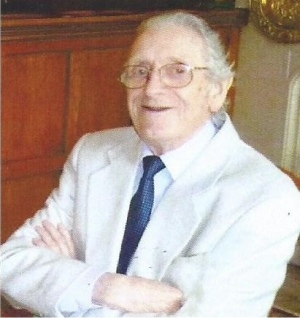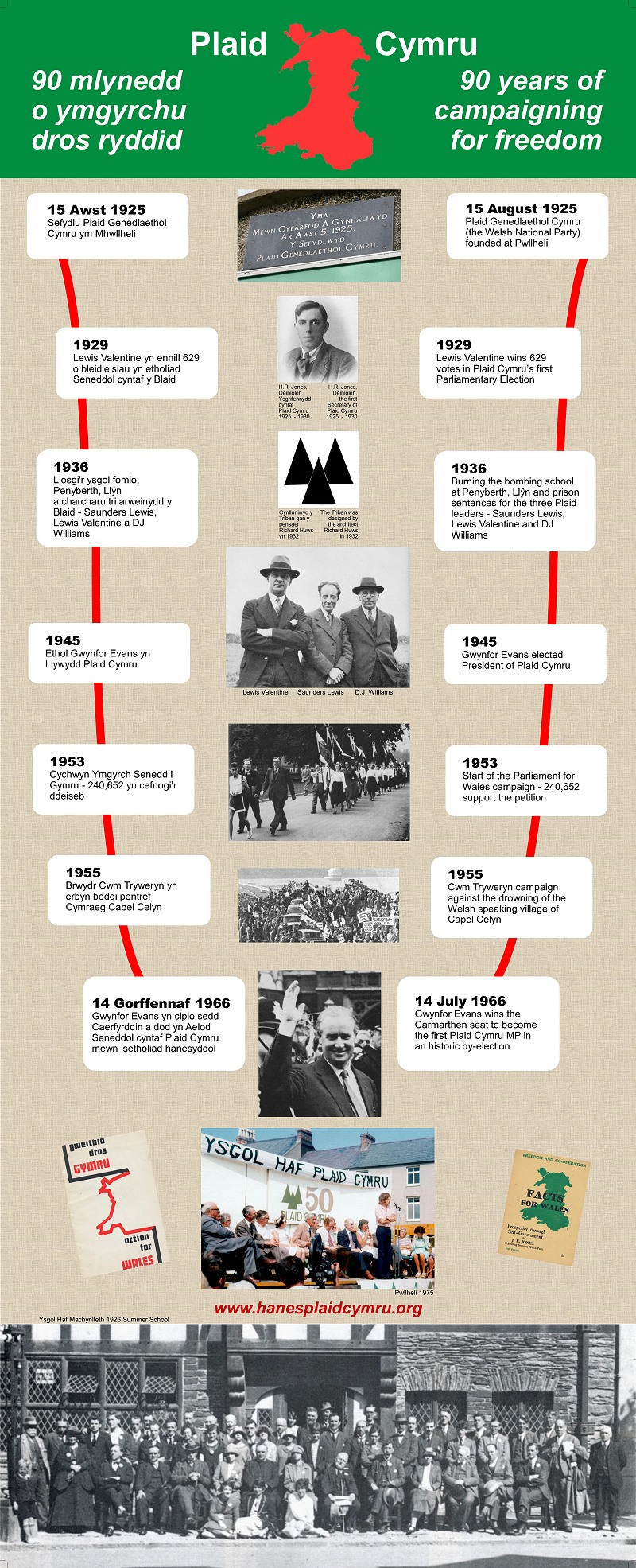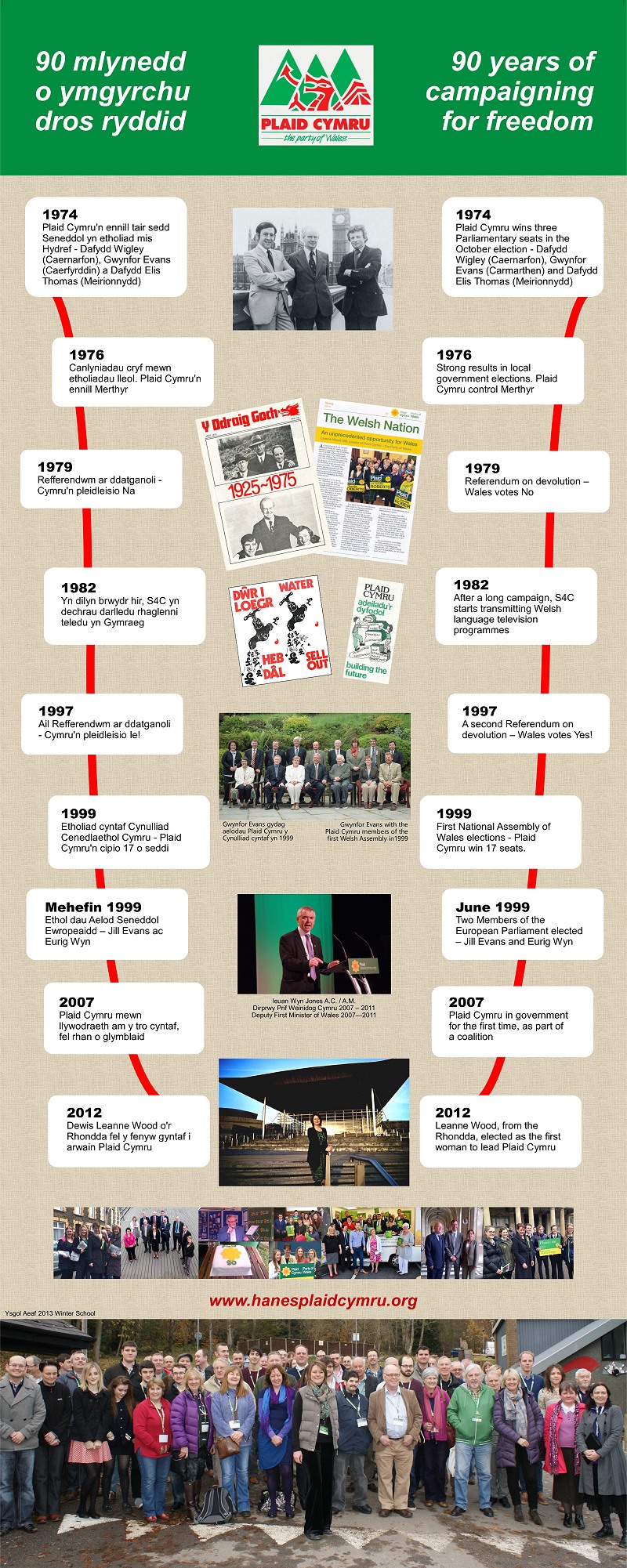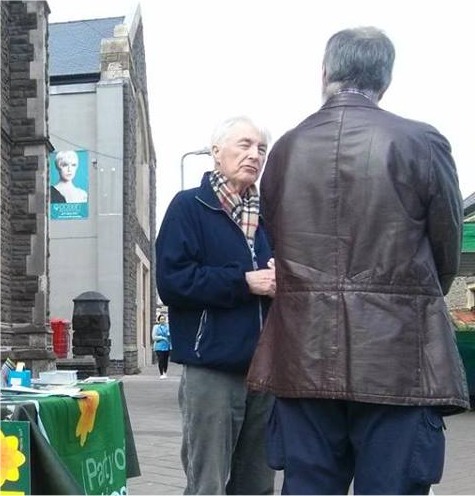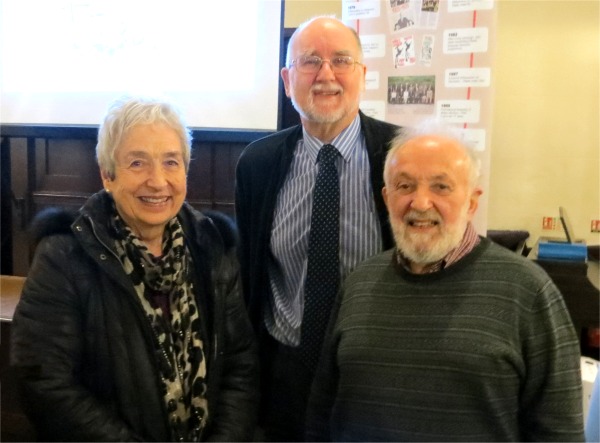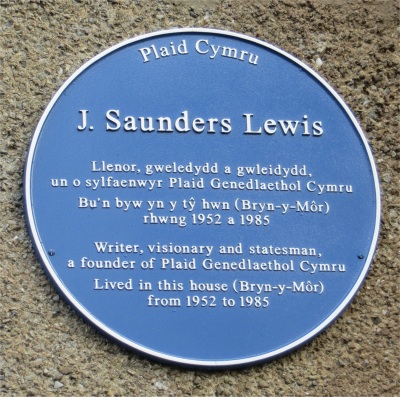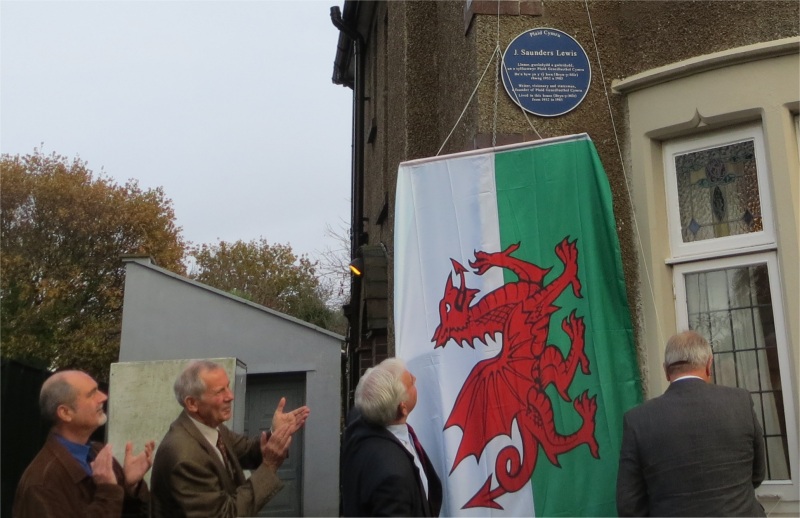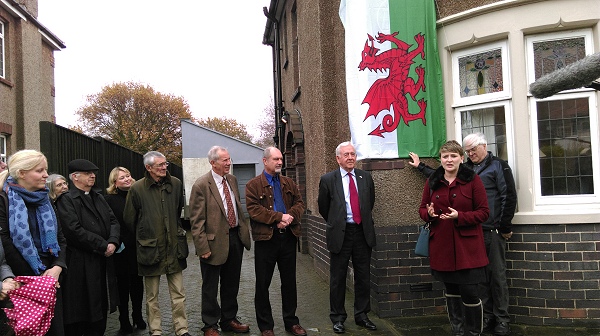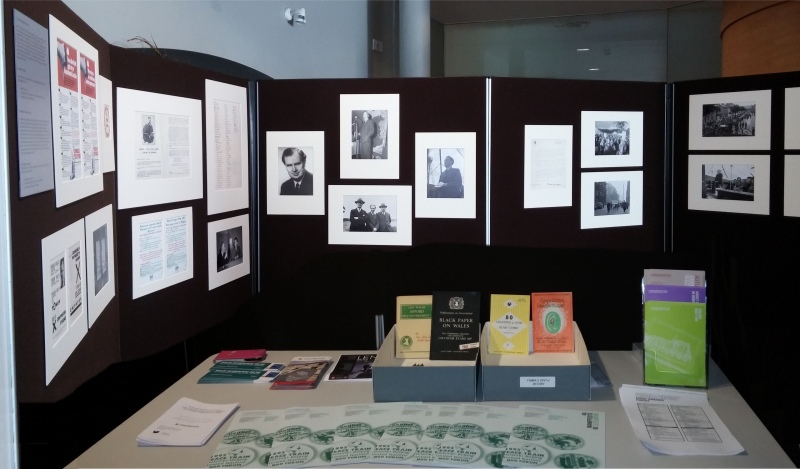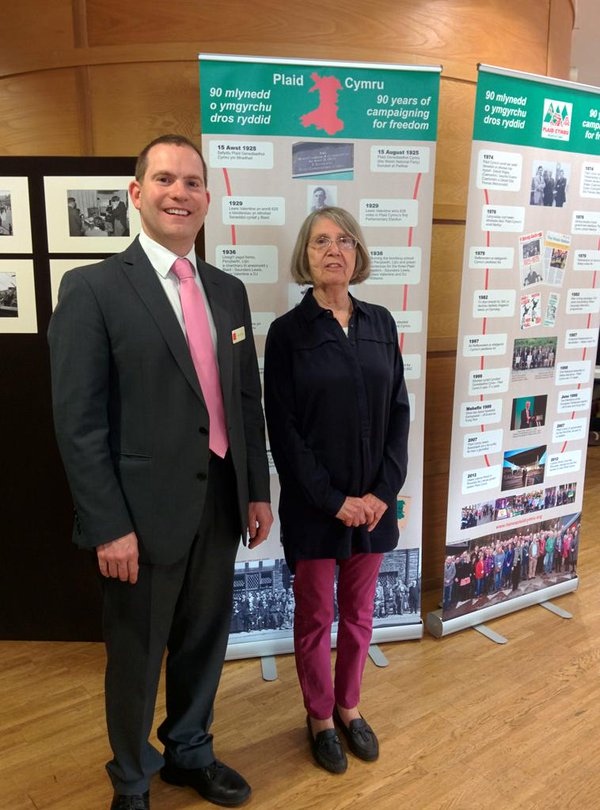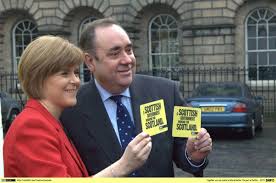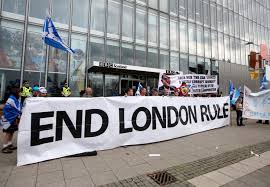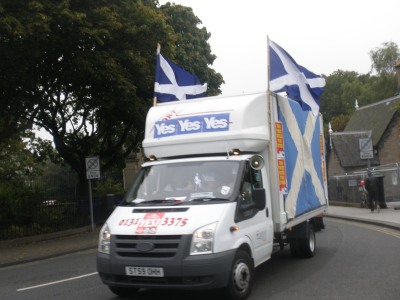Vic Davies – Rhondda’s Champion
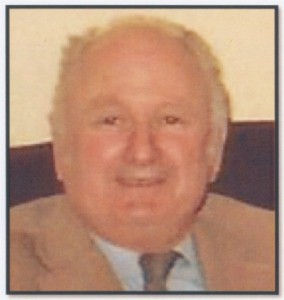
Tributes by Cennard Davies and Leanne Wood and Jill Evans
This tribute was delivered at the funeral of Vic Davies at Bethlehem, Treorci on Friday, 30 October 2015 by Councillor Cennard Davies. A native of Treorci, Rhondda, Cennard is the former head of the Language Studies Centre in Glamorgan University (now the University of South Wales). He has served as a Plaid Cymru councillor for Treorci since 1999.
Braint yw cael y cyfle hwn i dalu teyrnged i gyfaill a gyfrannodd gymaint i fywyd politicaidd yr ardal hon yn ystod ei oes hir ac ar yr un pryd i gydymdeimlo â’i deulu yn eu colled.
Today we share with Vic’s family their sense of loss, but also take comfort in the knowledge that he led a very long, active and purposeful life and this large congregation is evidence of the high esteem in which he was held both in this community and further afield.
Vic was born in Nanternis, New Quay, Ceredigion in 1917, the youngest of 6 children. His mother died soon after childbirth and his father brought him to Ystrad Rhondda to be reared by his coalminer friend, Tom Thickins and his wife. At first he took the name Thickins and always praised the love, kindness and support that he received from this family. It was only in later life that he learnt of his true background, eventually contacting his blood relatives in Ceredigion and reverting to the name by which we came to know him, Vic Davies.
After leaving Tonypandy Grammar School in 1934, he worked as a mechanic at Central Garage, Pentre and remained there until he was called up in 1940. He returned to the garage in 1945 before moving on to work for various companies including Rhondda Transport, Thomas & Evans and the Ministry of Defence. Vic continued studying in the evenings, eventually gaining qualifications that enabled him to join Pontypridd College of Further Education as a lecturer in motor mechanics. There he stayed until he retired. The urge to study and better himself remained throughout his life. After retiring he registered as a student at the University of Glamorgan and at the age of 73 was awarded a degree in the Humanities.
Whilst in the RAF Vic met his wife, Irene, a native of Hull. They married in 1945 and came to live in Prospect Place, Treorci, sharing the home with his adopted father, Tom Thickins. They had 3 children, John, Peter, who passed away in 1996 and Ann.
I first got to know Vic in the early 60s, working for him in the 1964 General Election. The prospects weren’t good as Labour were commanding huge majorities. In 1951, Iorrie Thomas had a 22,000 majority and won 81% of the vote here in Rhondda West when the constituency was half its present size! Everyone else, as you can imagine, lost their deposits. In politics, as in other aspects of life, there are periods of success and periods when you need to plug away until prospects improve. The early 60s was such a period and Plaid owes a great debt to people like Vic who stuck at a thankless task, without ever losing faith or conviction.
In the 1964 General Election, Iorrie Thomas secured 79 per cent of the vote, with Vic coming third behind the Tories. Two years later in 1966, undaunted, he stood again, this time managing to overtake the Tory but still lagging 16,888 votes behind Iorrie Thomas. Then, things changed dramatically. Iorrie Thomas died suddenly in December 1966. There was a Labour government in power, led by Harold Wilson, and in February 1966 the Parc & Dare Collieries, the largest employer in the area, finally closed and mining families, without alternative employment, felt betrayed. Gwynfor Evans had won a famous by-election victory in July 1966 in Carmarthen and with a by-election in the offing, there was a feeling in the air that things were changing.
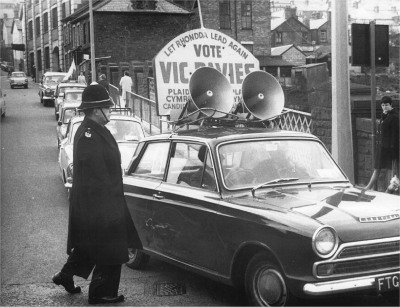
Vic was chosen to stand and I was appointed his election agent. The task we were facing was enormous. As George Gale, the Daily Express political correspondent put it the beginning of the campaign, ‘The constituency is surrounded by mountains and Plaid Cymru certainly have a mountain to climb’. We had to box clever and create an impression that we were much stronger than we actually were. Vic’s adoption meeting, for example, was held in Parc Hall, Cwmparc, a fairly small venue, but we distributed hundreds of invitations and when the big day arrived the hall was full to capacity with lots of people standing outside. The urban myth got round that a huge number of people had failed to gain admission to the meeting and, fortunately for us, the size of the hall was hardly mentioned. When the same tactic was used at a subsequent meeting at Judge’s hall, Trealaw even more people arrived, only to be refused admission at the door. Supporters flocked in from all parts of Wales to help in the campaign, ensuring that every house in the constituency was canvassed many times over. The evening before polling day the Parc & Dare was full to the rafters for a final rally, addressed by Gwynfor Evans, Meredydd Edwards, the actor, Illtyd Lewis, the powerful socialist debater as well as Vic himself. It was probably the biggest political gathering that this valley had seen in years and news of its success spread like wildfire. George Gale’s headline in the Express the following morning was simply ‘The Mountain is Moving’.
Well, it moved – but not far enough. Labour’s majority was slashed from 17,000 to 2,306, a swing of almost 30 per cent. Gwynfor Evans’ victory in Carmarthen had been explained away by saying it was a rural, Welsh speaking constituency but achieving such a result in the English speaking, industrial Labour heartland sent shock waves throughout Britain and was the forerunner of further success in by-elections in Merthyr and Caerffili. If seats like Rhondda West were to tumble, then Labour’s grip on its fourteen Valley seats would be in grave jeopardy. Harold Wilson’s government moved fast, announcing relocation of the Royal Mint, no less, to Llantrisant – amid protests from its London workforce and comments by the prominent Labour council leader T Dan Smith that north-east England would benefit from a good dose of Welsh nationalism! The Mint has been there ever since – quite a legacy.
By the time Vic fought the 1970 election, things had seemingly returned to their previous pattern, with Labour once more in the ascendancy. But Vic kept going, sticking to his socialist principles and his unbending belief in a self-governing Wales. He continued to fight local elections. Gwynfor Evans describes him in one of his books as a solid, dependable man, balanced in his views. Although Vic could sometimes appear to be a diffident canvasser on the doorstep he had strong social convictions and was Welsh to the core. In no way could he be described as flash or colourful, but he had a huge store of dogged determination to achieve his political ends. He was a strong supporter of Rhondda CND, believing fervently in unilateral nuclear disarmament, and joined with fellow members on the well publicised Christian CND march from Wallingford to Oxford.
In 2010, aged 93, Vic moved into Tŷ Pentwyn where he was content and well looked after. He spoke enthusiastically about his travels in North America, his interest in boxing and rugby and remained actively interested in politics to the end. His good friend, Roger Price and I tried to keep him informed of developments in Paid Cymru and the politics in general. Fortunately, we also managed to record some of his reminiscences that are now part of the Plaid Cymru history archive. > Atgofion Vic Davies
It is paradoxical that a man who never won an election made such a political impact on the life of this community. He lived to see the upper Rhondda Fawr become a Plaid Cymru stronghold, Geraint Davies winning the Assembly seat, Plaid Cymru controlling RCT Council, but I hope that he also realised that without his faith, determination and perseverance, that none of this would have been possible.
Diolchwn i Vic am ei ymroddiad, ei argyhoeddiad a’i ddyfalbarhad. Mawr yw ein diolch a’n dyled iddo. Heddwch i’w lwch!
Vic Davies, Man of Principle
A Tribute by Leanne Wood
I’m afraid I can’t talk of my memories and working with Vic when he stood in the famous by-election – I wasn’t born!
When I joined Plaid Cymru in the early 1990s, Vic Davies was coming to the end of his politically active life.
I have fond memories of Vic Davies and Glyn James – the veterans of Rhondda Plaid Cymru – attending constituency meetings, public meetings, social events.
To the end, Glyn was a firebrand. Vic was too – but in a quiet way. They complemented each other.
Vic was a thinker. His points were always very well thought through and always from a point of principle.
Vic was a socialist.
And whenever he made a political contribution – whether in a one-to-one conversation, or in a meeting – his sincerity, his quest for justice and recognition of the underdog shone through.
Today’s generation of political activists owe so much to Vic and the others of Vic’s generation.
And for that – on behalf of all of us – I say thank you, diolch yn fawr iawn.
You laid the foundations for the Wales we know we can be.
You taught us the importance of integrity and principle in politics – and we will continue with your work.
We will build on the foundations that you laid.
Vic – your contribution to the national cause of Wales, the defence of working people and for peace was immense.
From the bottom of my heart I thank you for all that you did and all that you were.
Diolch o galon. Cwsg mewn hedd. Nos da Vic.
Vic Davies, Rhodda Pioneer
A Tribute by Jill Evans
Mae’n anrhydedd mawr i gael y cyfle heddiw i ddweud rhywbeth. Rwy’n ddiolchgar i’r teulu ac mae meddyliau ni i gyd gyda nhw yn ystod y cyfnod anodd yma.
Hoffwn sôn am rhai o’r pethau rwy’n cofio mwyaf am Vic. Fe wnaethon ni gydweithio dros y Rhondda, dros Gymru a dros heddwch.
It is a special honour to be asked to speak today. I am grateful to the family and all our thoughts are with them at this difficult time.
I’d like to mention a few of the things I remember most about Vic from the time we worked together for the Rhondda, for Wales and for peace.
I knew the name Vic Davies a long time before I met him, of course. Everyone in Plaid Cymru knows the name. Vic was one of the pioneers, the heroes, who showed us it could be done. There may have been several years between 1967 and 1999, but Geraint’s victory in the Rhondda was Vic’s too.
I was only seven at the time of the famous by-election so I don’t remember that event. But Vic had a big influence on my life that I don’t think he was really aware of. I used to walk to Bodringallt Junior School from my home in Tyntyla Road, where he had also lived when he was young. Every day I passed the marble plaque in the garden by the Star which read “Hiroshima, Nagasaki 1945, Never Again”. Those words were forever etched on my mind. I didn’t understand them when I was little, of course. But I came to understand them only too well.
As a founder member of Rhondda CND, Vic was one of the small group of people who placed that plaque there. I have been active in the peace movement all my life, as he was. I don’t believe that’s a coincidence. Vic helped me understand early on the folly of nuclear weapons.
Having heard the much repeated stories about 1967, I was surprised when I first met the quietly spoken, quite unassuming man that was Vic Davies. It was in a Plaid constituency meeting in the Gelli Hotel. I was in awe of him, but he soon dispelled that. He was more interested in learning about other people than talking about himself.
I remember walking into the bar of the Star Hotel with him for one of the Rhondda CND meetings and being conscious of people looking over and nudging each other. People recognised him, but he seemed oblivious to it, or maybe just pretended to be.
His gentleness was in contrast to the strength of his convictions. He always said it about me – and now I can say it about him – he had steel in him. The strongest beliefs. A socialist, a European, a nationalist and internationalist, he took the side of the weak against the strong, with an absolute dedication to peace and disarmament. He was on every march through the Rhondda.
In the eighties, at the height of the Cold War, he went driving around Eastern Europe, talking to ordinary people, learning about their lives, making friends with those people we were supposed to think of as our enemies, breaking down barriers, venturing behind the Iron Curtain. He was brave as well as everything else.
Talking was one of the things he loved best. He loved a political debate! When Vic came to Plaid Cymru National Council, he was always in the group discussing international affairs and Europe. He listened to other peoples’ views. He was thoughtful and wise and knowledgeable. And highly respected.
He never pushed himself forward – not your usual politician, you might say – but he would encourage others. I am lucky to be one of those people. I will always be grateful for Vic’s support. Whenever I spoke at a meeting, however tricky things got, I knew that if Vic was in the audience I had strong back up! He gave me confidence.
No one was more delighted when I was the first Rhondda member ever elected to the National Executive of Plaid Cymru!
Nicola Sturgeon reminded us in the Plaid Cymru conference last week, that we stand on the shoulders of giants. To me, to all of us, Vic is one of those giants. I will always be grateful for his inspiration, his support, his friendship. A great man who made a difference – to the Rhondda, to Wales – and for peace.
Diolch Vic am yr ysbrydoliaeth, y gefnogaeth a’r cyfeillgarwch.
Fe wnest ti wahaniaeth i’r Rhondda, i Gymru – a dros heddwch.

